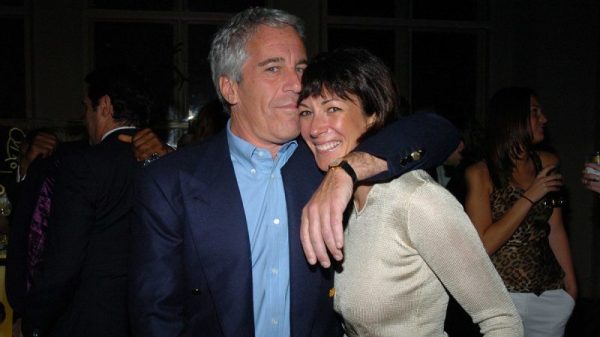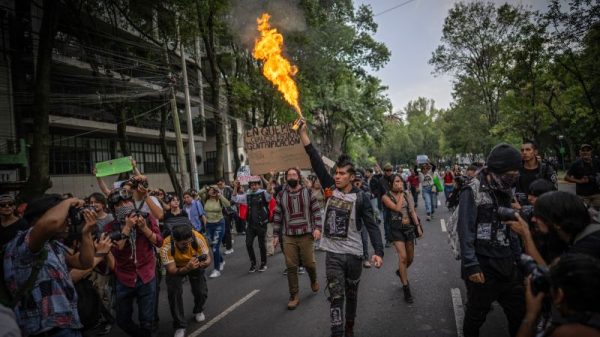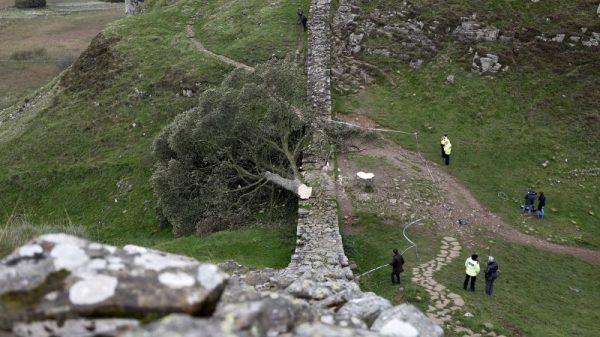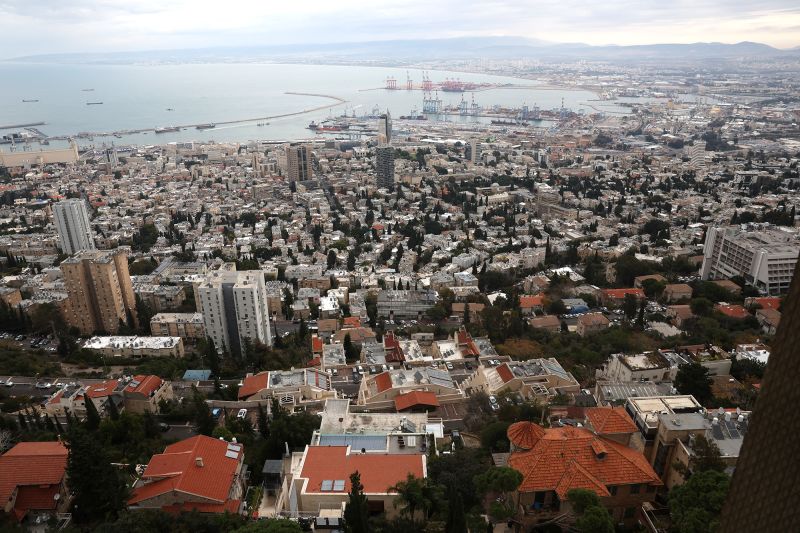In the months before Iranian ballistic missiles struck the Nevatim Airbase in October, Iran dispatched spies to film and photograph the site in southern Israel, according to Israeli authorities.
The alleged operatives were neither highly trained nor seemed especially suspicious to the people who knew them in their day-to-day lives. Many of them appeared to struggle financially.
And yet, Israeli authorities allege that the images they captured of the base provided Iran with valuable targeting intelligence.
The Israel Police arrested the suspects in October, a group of seven Israelis living in Haifa, northern Israel, representing one alleged cell.
They are among more than 30 Israelis arrested by Israeli authorities over the past year for allegedly carrying out missions for Iran – with the accusations ranging from photographing military bases to plotting to kill senior Israeli officials.
It is an unprecedented number, according to Israel Police Superintendent Maor Goren, who oversees counterintelligence investigations.
“If we go check the last years – the last decades – we can count on two hands how many people got arrested for this,” Goren said.
It is a sign both that Iran has ramped up its intelligence-gathering efforts in Israel in recent years, and that – after operating for months or, in some cases, years without being detected – Israeli authorities are finally catching on to these under-the-radar activities.
Israeli authorities are still uncovering more alleged Iranian intelligence-gathering efforts. Earlier this week, Israeli police arrested a 33-year-old Israeli citizen from the north who allegedly carried out tasks on behalf of Iran in exchange for thousands of dollars.
The arrests have made waves in Israel in recent months. Beyond the sheer numbers, the majority of those arrested have been Jewish Israelis – a shock in a country where Jewish citizens are imbued with a deep sense of patriotism and national pride.
“I wasn’t surprised – I was shocked. It was like thunder amid clear skies,” said Leonid Gorbachovsky, the next-door neighbor of the accused ringleader of the Haifa cell, Azis Nisanov.
“He didn’t have anything prominent in him, nothing that would make me or anyone from our house suspect that he would be connected to something illegal. He was an ordinary man.”
Gorbachovsky was home when police pried open Nisanov’s door with a metal bar and watched as police turned the apartment inside-out, finding piles of cash, he said.
Like most of the other Israelis arrested on charges of spying for Iran, Nisanov had immigrated to Israel. Combined with financial struggles, intelligence experts say that an immigrant background could make the accused easier targets for Iran’s recruitment efforts.
To Gorbachovsky, who moved to Israel 25 years ago from Belarus, it is unfathomable.
“How can a person come to a foreign country – to Israel – from a different state and hate it?” Gorbachovsky said. “Well, if it was because of money, then this is a rotten person. How can you sell your motherland for money, even if this is big money? This is your state. How can it be?”
The ‘Haifa Seven’
Israeli police allege that Nisanov, an Azerbaijani immigrant, began carrying out tasks for Iran more than two years before his arrest, after being contacted by an Azerbaijani national who was working as a foreign agent for Iran. According to the indictment, the foreign agent tasked Nisanov with photographing military bases.
For two years, Nisanov and six others he recruited photographed dozens of military bases, Iron Dome batteries and other strategic sites across Israel, receiving between $500 and $1,200 per task, according to the indictment. The indictment notes that several of the bases they photographed were later struck in missile attacks by Iran and its proxy in Lebanon, Hezbollah.
While the GPS coordinates of the bases are known to Iran, Israeli authorities say the zoomed-in images Iran received from these Israelis provided additional targeting intelligence.
“We can’t tell for sure if they are directly responsible for the hit, but we can say for sure that they were there before the attack… so you can say it at least helped, if not more,” Goren said.
Israeli police claim Nisanov and the six others knew they were working for Iran. All seven are still awaiting trial on spying charges. They have not yet entered a plea.
“He needed a lot of money. He owed money to a loan shark, and he had really bad financial problems,” Talhami said. “He never thought that he was doing something that is harming the security of the state of Israel.”
Others arrested by the Israeli police included a couple in the city of Lod in November for allegedly “conducting intelligence gathering missions” on behalf of an Iranian spying network.
A police statement, quoting a senior official in the Shin Bet, Israel’s domestic intelligence agency, said that these cases “add to a series of thwarted attempts exposed in recent weeks, during which Israeli citizens operated by Iranian intelligence elements were arrested.”
Alleged assassination plots
While many of the alleged Iranian spies were only tasked with photographing and filming strategic sites, others are accused of plotting to kill senior Israeli officials and other prominent Israelis.
In August, Israeli police arrested 73-year-old Moti Maman, an Israeli from the southern city of Ashkelon, for allegedly plotting to assassinate Israeli Prime Minister Benjamin Netanyahu, then-Defense Minister Yoav Gallant and Shin Bet head Ronen Bar.
Maman was smuggled into Iran twice and met with Iranian intelligence agents who asked him to carry out attacks against Israel, according to his indictment. Authorities allege he received payments to carry out missions on behalf of Iran.
The indictment detailed Maman’s travel history as a businessman who lived for extended periods in Turkey, where he allegedly developed relations with Iranian nationals.
It alleged that Maman agreed, through Turkish middlemen, to meet with a wealthy Iranian businessman known as “Eddy” to discuss business in the Turkish city of Samandag. On two separate occasions in April and May, the businessman was unable to leave Iran due to “legal difficulties,” so Maman was then smuggled into the country through a land crossing in eastern Turkey.
In Iran, Maman allegedly requested an advance payment of $1 million, the indictment said.
According to the indictment, “Eddy” allegedly said the plots would be revenge against the assassination of Hamas political chief Ismail Haniyeh on Iranian soil in July, which would prevent the outbreak of all-out war with Israel.
In another case, Goren, the police superintendent, said police arrested a man who was suspected of plotting to carry out an assassination on Iran’s behalf with a gun and 15 bullets.
Iranian tactics
Iran and Israel have been waging a shadow espionage war for decades, using spies and informants to gather intelligence to carry out attacks against each other.
Israel’s intelligence capabilities inside Iran are understood to be vast and Israeli intelligence has carried out multiple successful assassinations inside Iran.
Following the October 7 Hamas-led attack on Israel, that silent war was thrust out in the open, resulting in the first open military attacks carried out between the two countries.
Iran has also arrested several of its citizens over the last year, whom the regime and the Revolutionary Guard Corps accuse of spying for Israel or collaborating with its foreign intelligence agency Mossad, according to Iranian state media.
Israeli officials and intelligence experts say the uptick in Iranian spying activity that has been exposed in Israel reflects broad-based recruitment tactics employed by Iran.
Oded Ailam, the former head of counterterrorism for the Mossad, calls it “the theory of the big numbers.”
“They are not really discouraged by failure,” Ailam said. “And most important, they don’t really care what happens afterwards to their assets… they say to themselves, ‘OK, if we fail, here we go to the next one.’ And they don’t really care about the outcome.”
According to Goren, the police official, Israel’s Shin Bet was primarily responsible for uncovering and infiltrating the alleged Iranian spy rings, through a combination of digital surveillance and undercover operations.
Israeli authorities say while some of the accused spies were recruited through intermediaries, others were approached on social media platforms, including Telegram.
One message read: “I have various missions in the cities of Israel that not everyone has the ability to do. My missions have rewards from $100 to $100,000.”
Another said: “We just need brave men. Are you brave? For a lot of money?”
Goren said the Iranian recruiters often began by asking their targets to carry out small “test missions” for easy money, steadily increasing the seriousness of the missions and further compromising their targets. Goren said such a test mission could involve taking a picture of a building or spraying graffiti on a wall.
In one series of messages provided by the Shin Bet, the target was tasked with buying gasoline to set off forest fires.
“They want fast money,” Goren said of the accused spies. “They don’t care about the country, they don’t care about their own people, they just want money.”
‘Easy prey’
Ailam, the former Mossad official, said those who fall into the wide net cast by Iran are often “desperate people from the part of society that is usually neglected and overlooked.” Many of those arrested are also immigrants, who Ailam said may not have “the same affiliation and the same attitude towards Israel” as others.
“They are much more easy prey,” Ailam said.
Vyacheslav “Slava” Gushchin, alleged to be part of the “Haifa Seven,” appeared to fit this profile to a T.
When he was arrested, neighbors at first thought it stemmed from a fight he had gotten into with an attendant at the nearby convenience store.
None of them suspected he was allegedly spying for Iran. Gushchin’s attorney declined to comment.
His arrest sent shockwaves through a neighborhood that had sought to help him, giving him food, clothes and even lending him money.
“No one could believe it,” Moshe Yazdi said. “People here that know him – that also brought him food and everything – want to kill him. If he came here again, the neighbors would kill him.”

































